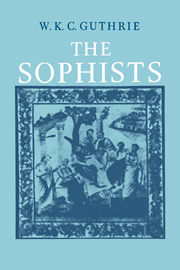Book contents
- Frontmatter
- Contents
- List of Abbreviations
- Preface
- I INTRODUCTION
- II TOPICS OF THE DAY
- III WHAT IS A SOPHIST?
- IV THE ‘NOMOS’ – ‘PHYSIS’ ANTITHESIS IN MORALS AND POLITICS
- V THE SOCIAL COMPACT
- VI EQUALITY
- VII THE RELATIVITY OF VALUES AND ITS EFFECTS ON ETHICAL THEORY
- VIII RHETORIC AND PHILOSOPHY (Seeming and being, believing and knowing, persuading and proving)
- IX RATIONALIST THEORIES OF RELIGION: AGNOSTICISM AND ATHEISM
- X CAN VIRTUE BE TAUGHT?
- XI THE MEN
- Bibliography
- Index of passages quoted or referred to
- General Index
- Index of selected Greek words
II - TOPICS OF THE DAY
Published online by Cambridge University Press: 05 August 2015
- Frontmatter
- Contents
- List of Abbreviations
- Preface
- I INTRODUCTION
- II TOPICS OF THE DAY
- III WHAT IS A SOPHIST?
- IV THE ‘NOMOS’ – ‘PHYSIS’ ANTITHESIS IN MORALS AND POLITICS
- V THE SOCIAL COMPACT
- VI EQUALITY
- VII THE RELATIVITY OF VALUES AND ITS EFFECTS ON ETHICAL THEORY
- VIII RHETORIC AND PHILOSOPHY (Seeming and being, believing and knowing, persuading and proving)
- IX RATIONALIST THEORIES OF RELIGION: AGNOSTICISM AND ATHEISM
- X CAN VIRTUE BE TAUGHT?
- XI THE MEN
- Bibliography
- Index of passages quoted or referred to
- General Index
- Index of selected Greek words
Summary
In volume II (ch. VI) I briefly sketched the climate of thought in the fifth century, especially at Athens, and the effect in several different fields of the substitution of natural for divine causation. The present chapter will attempt an outline of the main causes and features of this changing outlook, before we go on to consider the meaning of Sophistic and investigate each separate topic in detail.
To determine the causes of an intellectual revolution is always a rash undertaking, and when a great many things are happening together it is not always easy to distinguish cause from effect; but a few things may be mentioned as more likely to belong to the former category. We are bound to dismiss, on chronological grounds, the assumption that the ‘Presocratics’, and in particular the Ionians, could all have been influential in moulding the thought of the Sophists. If there is any causal connexion between the ideas of Democritus and those of Protagoras or Gorgias, it is more likely to have been the other way round. On the other hand the influence of the Eleatics on Protagoras and Gorgias is undeniable, as is that of Heraclitus on Protagoras, and Gorgias is said to have been a pupil and follower of Empedocles. One of the most powerful influences for humanism is to be found in the theories of the natural origins of life and society which were a feature of Ionian thought from Anaximander onwards. Life, including human life, was the product of a kind of fermentation set up by the action of heat on damp or putrefying matter, and social and political groups were formed by agreement as man's only effective form of defence against non-human nature. The cosmogonies themselves assisted in banishing divine agents from the world, not because they were evolutionary rather than creative—the idea of divine creation was never prominent in Greek religion—but because they made more difficult the Greek habit of seeing divine or semi-divine beings every-where in nature.
- Type
- Chapter
- Information
- A History of Greek Philosophy , pp. 14 - 26Publisher: Cambridge University PressPrint publication year: 1977



